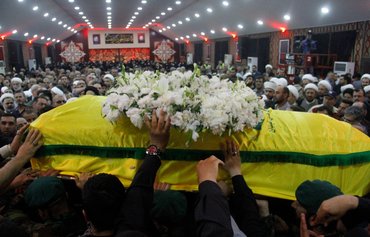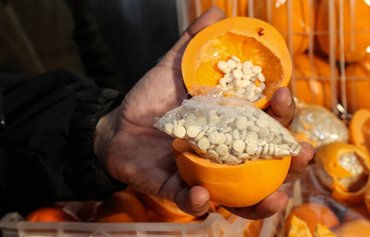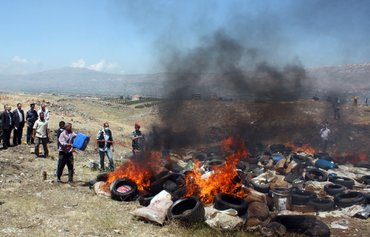BEIRUT -- Disagreements between Lebanese Hizbullah and the Syrian regime's 4th Division have escalated in recent weeks, Lebanese and Syrian observers and activists confirmed.
Tensions have been brewing over the division of profits generated from drug and fuel smuggling operations, and the 4th Division's pursuit of territorial control.
The 4th Division, led by the Syrian president's brother, Maher al-Assad, is an elite formation of the Syrian Army whose primary purpose is to defend the government from internal and external threats.
There has been an escalation in the frequency of armed clashes between the two sides, activists say, the most recent of which occurred last month in the eastern desert (Badiya) of Syria, where both sides share influence.
![A Syrian youth sells fuel in the town of Sarmin, about 8km southeast of the city of Idlib in northwestern Syria, on March 10, 2020. [Ozan Koze/AFP]](/cnmi_di/images/2022/02/08/33948-syria-fuel-shortage-600_384.jpg)
A Syrian youth sells fuel in the town of Sarmin, about 8km southeast of the city of Idlib in northwestern Syria, on March 10, 2020. [Ozan Koze/AFP]
Armed clashes broke out in early January against the backdrop of Hizbullah's refusal to support the 4th Division in a campaign it launched against the "Islamic State of Iraq and Syria" (ISIS) in the Badiya, Syrian opposition websites said.
Hizbullah commanders in the Khirbet Tiyas area of rural Homs refused to send in reinforcements to assist the 4th Division after it came under attack from ISIS.
This led to the setup of temporary checkpoints and the arrest of elements from both sides. Two Hizbullah and one 4th Division members were killed in the ensuing clashes, and seven people were injured.
The clashes between the two sides reignited later in January after Hizbullah refused to pay the 4th Division its commission from Iranian oil tanker trucks in the Khirbet Tiyas area, close to the Tiyas (T-4) air base.
The clashes resulted in deaths and arrests on both sides and led to the establishment of more checkpoints, Syrian academic researcher and Hizbullah specialist Turki Mustafa told Al-Mashareq.
Restrictions and a curfew were imposed on Hizbullah commanders last year, with the 4th Division tightening security at border crossings, according to earlier reports.
The Syrian Observatory for Human Rights reported in September that a dispute erupted between the two sides following the passage of tankers loaded with Iranian fuel from Syria to Lebanon under the auspices and protection of Hizbullah.
The 4th Division forces manning the checkpoints had demanded their share of mazout (fuel oil) from Hizbullah, given its dearth in Syrian markets, the Observatory said.
Frequent friction
Palmyra News Network director Mohammed Hassan al-Ayed said the situation on the ground in the Badiya between the 4th Division and Hizbullah is "tense".
"The area is witnessing intense disagreements and frequent friction," he said.
Syria's eastern desert is of strategic importance, he said, due to its proximity to the Iraqi and Jordanian borders and the many border crossings that Hizbullah and the 4th Division use to smuggle drugs and weapons.
Iraqi and Jordanian forces have busted several of these operations in recent months, he said.
On January 27, Jordanian border guards killed 27 drug smugglers as they tried to enter the kingdom simultaneously from various locations in Syria under the cover of snow.
According to al-Ayed, the root of the dispute between Hizbullah and the 4th Division is "closely related to the drug trade and control of the smuggling routes and checkpoints".
These constitute "a major source of funding for both sides" from the imposition of tributes and bribes in exchange for allowing the passage of drugs, he said.
The tension between the 4th Division and Hizbullah and the Syrian militias affiliated with it "extends to multiple areas under regime control", he added.
The clashes between the two sides in early January were not the first, said Mustafa, the Syrian academic researcher.
"Their relationship has been fraught with tension that often culminated in armed clashes," he said.
Financial crisis
The cause of these disputes "stems from the fact that Hizbullah has been facing a financial crisis since the Iranian funding stopped and due to the impact of the Caesar Act on the 4th Division", Mustafa said.
The Caesar Syria Civilian Protection Act of 2019 is a series of sanctions designed to hold the regime of Bashar al-Assad to account for its crimes.
It penalises companies worldwide that deal with the Syrian regime and blocks US reconstruction aid until perpetrators of abuses in Syria's war are brought to justice.
Southerners for Freedom co-ordinator and Lebanese political activist Hussein Ataya said the dispute between Hizbullah and the 4th Division is linked to "the huge revenues" generated from the smuggling and trafficking of drugs.
"The cost of manufacturing one Captagon pill is estimated at 35 cents, while it is sold in Gulf markets for $20 a pill," he said, referring to a highly addictive amphetamine.
They also fight over who controls both previously existing border crossings and those created by Hizbullah between Lebanon and Syria after it intervened in Syria in 2012, he added.
The dispute between them "has extended to the Syrian desert, especially to eastern rural Homs, all the way to Palmyra, and was aggravated by the involvement of influential Hizbullah commanders in the smuggling of Syrian antiquities", Ataya said.
It recently intensified due to the insistence of the 4th Division on dividing the revenue from smuggling drugs, he said, including Captagon pills manufactured in factories across the western Qalamoun region, western rural Damascus, rural Homs and Latakia.
For this reason, Ataya said, "the 4th Division redeployed its elements to these crossings and began harassing Hizbullah elements and Lebanese politicians who revolve in the party's orbit, at the Masnaa and Jdeidet Yabous crossings".
It has been restricting passage via legal and illegal crossings, he said, which has led to an increase in friction by the day.

![Tankers carrying Iranian fuel and transported by Hizbullah arrive from Syria at al-Ain in Hermel in east Lebanon's Bekaa Valley on September 16. [AFP]](/cnmi_di/images/2022/02/08/33947-lebanon-fuel-tankers-600_384.jpg)






